The Conversation API Zapier integration allows you to use features of the Conversation API with your Zapier solutions. There are a number of Conversation API triggers and actions you can include in your Zaps, which are automated workflows created using Zapier.
Descriptions of Zaps, general prerequisites, the Sinch Conversation API actions and triggers, are below.
This section includes instructions and images provided by a third-party. Third-party tools, software, and documentation are subject to change at any time. Refer to Zapier's Automation basics article for the latest information from the third-party source.
Zapier allows you to automate processes between apps by configuring workflows based on triggers and actions. These workflows are called Zaps. Each Zap has a trigger and one or more actions that follow that trigger. Triggers are events that start the Zap, and an action is what the Zap does in response to the starting event/trigger.
This is done using Zapier's UI, which allows you to configure the various stages of your workflow.
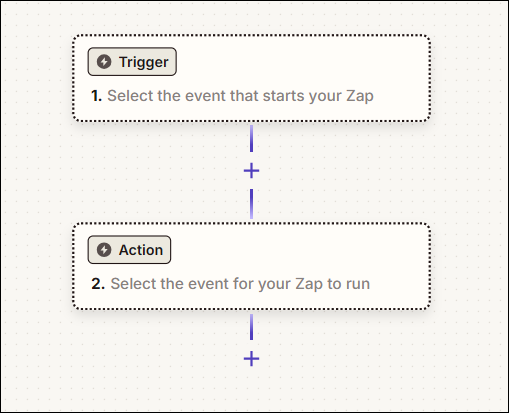
The various triggers and actions of the Zap can usually then further be configured using a menus and forms.
If you would like more general information on Zap construction, see Zapier's Create your first Zap quick start guide. You may also review the summary of Zap creation provided below.
Note the following:
This section includes instructions and images provided by a third-party. Third-party tools, software, and documentation are subject to change at any time. Refer Zapier's Create your first Zap quick start guide for the latest information from the third-party source.
This section is included for illustrative purposes. Before attempting to create your own Zap, ensure you meet the Zapier and Conversation API prerequisites.
The construction of a basic Zap is summarized below:
First, add event trigger to the Zap. When using Sinch's integration with Zapier, you can choose from a number of Sinch-specific triggers (for example, receiving an inbound SMS message).
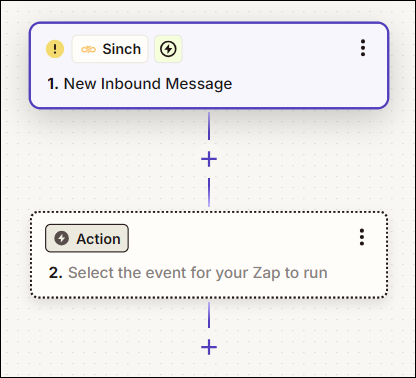
Following the trigger, you may add an action. Again, there are numerous Sinch-specific actions available to you (for example, sending a message).
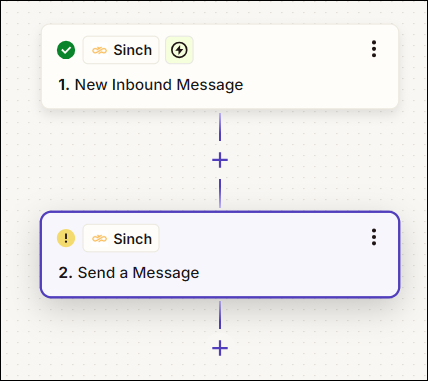
After establishing the trigger and action, you can decide what information you want passed from the trigger step to the action step. For example, if your event trigger is receiving an SMS and your action is sending an SMS, you can pass the original phone number (retrieved from the trigger) and use it as the recipient for the send message action.
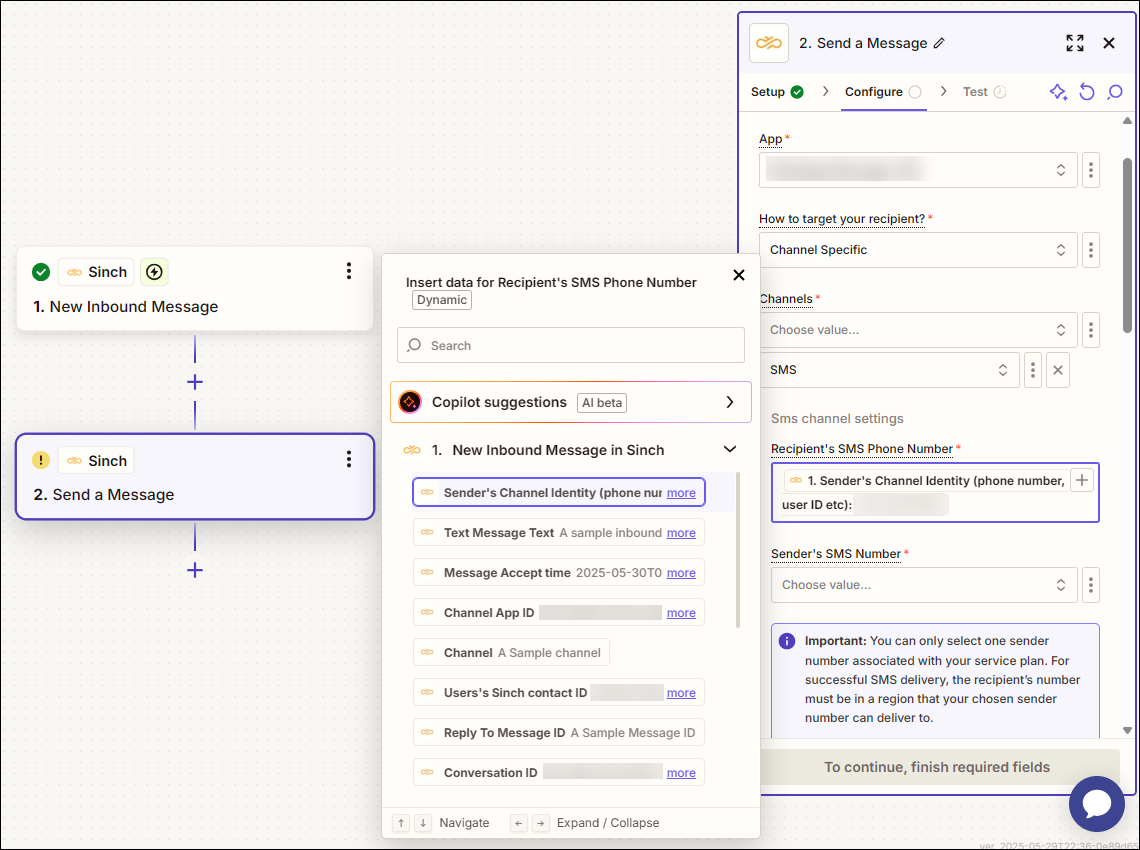
The above description is a very basic version of a Zap. You can include multiple paths of logic to address various situations. Additionally, although this basic example uses a Sinch-specific trigger and a Sinch-specific action, you can use other apps with Sinch-specific triggers and actions. For example, you may decide to use the addition of a new row in a Google Sheets file as your trigger event, followed by a send message action from Sinch.
After setting up your Zapier and Sinch accounts, you can connect your project to your Zapier account and begin adding Sinch-specific triggers and actions.
In order to successfully integrate your Conversation API project and apps with your Zapier account, you must ensure that the following prerequisites are met.
Ensure that you have created a Zapier account.
In order to successfully connect a Conversation API project to a Zapier account, and use Sinch actions and triggers with Zapier, you must have at least one Conversation API app with at least one configured channel.
If you haven't yet created a Conversation API app, see this Getting started guide.
Once you have at least one Conversation API app configured, collect the information described in the following sections.
This is the unique ID that identifies your project. For information about projects and where to find your project ID, expand the article below.
You'll need to keep track of the name and/or app ID of the Conversation API app you created. Each Conversation API app can have one or more channels associated with it, and you use that app to send and receive messages on the configured channels.
Conversation API apps are associated with a region upon creation. The data related to that app will be stored in servers located in that region.
For more information on Conversation API apps, expand the article below.
Access key and secret combinations allow you to authenticate when using the Conversation API.
For information on how to find create and find your access key and secret combinations, expand the article below.
After you have met the above prerequisites, you are ready to connect your Conversation API account and project to your Zapier account.
In order for any Conversation API triggers or actions to function in your Zap, you must connect your Conversation API project to Zapier. In order to connect your Conversation API project to Zapier, you'll need to have the following pieces of information (found on the Sinch Build Dashboard) readily available:
- Your access key ID
- Your access key secret
- Your project ID
To connect your account, simply begin configuring a Sinch trigger or action. If you have never connected a Sinch project to Zapier, you are prompted to do so. If you have already connected a Sinch project to Zapier, but would like to connect a new one, you can select + Connect a new account from the Sinch account drop-down list.
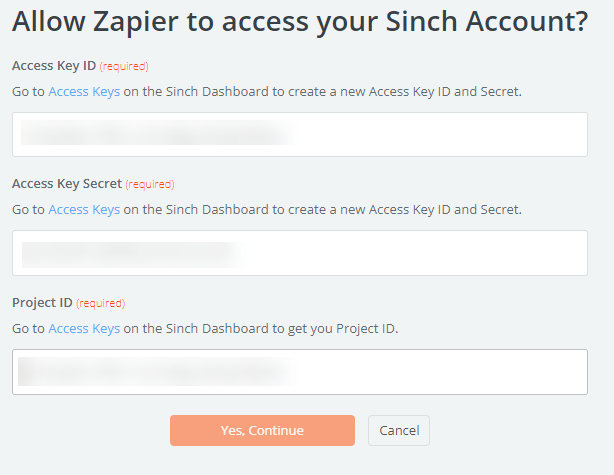
Enter the information and click Yes, Continue when you are done. Your Sinch project is now connected to Zapier! You will be able to select this project from the Sinch account drop-down list whenever you configure a Sinch Conversation API trigger or action.
Whenever you set up a Sinch Conversation API trigger or action, you must select the Conversation API app that will be used to recognize the trigger or complete the action. The available apps are based on which project you selected at the beginning of the trigger or action configuration process.
There are a number of triggers, or events, that are defined for the Conversation API Zapier integration. These triggers can be used to initiate other Zapier actions. For the Conversation API integration, these Zapier triggers act as webhooks that can subscribe to Conversation API callback triggers.
You can create, at most, five webhooks per Conversation API app. Each Conversation API Zapier trigger you create counts towards the maximum number of webhooks you can create per Conversation API app. If you attempt to associate a new Zapier trigger with a Conversation API app that already has five webhooks, a Webhook to delete drop-down list is displayed, allowing you select an existing webhook to replace.
After you configure a Conversation API trigger in Zapier, you'll gain access to the information provided by the Conversation API callback that is made when the corresponding callback trigger is activated.
This instant trigger is activated when an end-user sends a message to your Conversation API app. It corresponds to the MESSAGE_INBOUND callback trigger, and gathers information provided by the Inbound Message Conversation API callback. When this trigger is activated, the following fields are made available:
| Field | Description |
|---|---|
| Text Message Text | The text included in the inbound message. |
| Message Accept time | Timestamp marking when the channel callback was accepted/received by the Conversation API. Represented in ISO 8601 format. |
| Channel | The Conversation API channel on which the message was sent. |
| Sender's Channel Identity (phone number, user ID etc) | The identifier for the contact on the underlying channel. For example, the MSISDN corresponding to the contact if the message was sent on the SMS channel. |
| User's Sinch contact ID | The contact ID belonging to the user that sent the message. |
| Reply To Message ID | A reference to the message that the corresponding contact message is responding to. This field is only set if the responding contact message was sent within 3 days of the original message. This feature is only supported on the following channels: WhatsApp, Telegram, Messenger, Instagram, and Viber BM. |
| Conversation ID | The ID of the conversation of which this message is a part. |
| Message Direction | The direction of the message. Always set to TO_APP for contact messages. |
| Message ID | The ID of the message. |
| Message Metadata | Any metadata associated with the corresponding conversation. |
| Conversation Metadata | The value assigned to the conversation_metadata field in a send message request that is associated with this conversation. |
| Message Type | The type of the sent message. |
| App ID | The ID of the Conversation API app that received the message. |
| Channel App ID | The ID of the Conversation API app that received the message. |
| Raw JSON response | The full JSON response of the callback. |
| Accepted time | Timestamp marking when the channel callback was accepted/received by the Conversation API. Represented in ISO 8601 format. |
| Event time | Timestamp of the event as provided by the underlying channels. Represented in ISO 8601 format. |
| Project ID | The ID of the project to which the app that received the message belongs. |
| Trigger Type | The callback trigger type of the callback. |
This instant trigger is activated when one or more Conversation API callback triggers are activated. You must select the Conversation API Callback Triggers that will activate this Zapier trigger. The choices in the Callback Triggers drop-down menu are:
- Message Inbound, which corresponds to the
MESSAGE_INBOUNDcallback trigger - Message Submit, which corresponds to the
MESSAGE_SUBMITcallback trigger - Message Delivery, which corresponds to the
MESSAGE_DELIVERYcallback trigger - Event Inbound, which corresponds to the
EVENT_INBOUNDcallback trigger - Event Delivery, which corresponds to the
EVENT_DELIVERYcallback trigger - Channel Event, which corresponds to the
CHANNEL_EVENTcallback trigger - Conversation Started, which corresponds to the
CONVERSATION_STARTcallback trigger - Conversation Stopped, which corresponds to the
CONVERSATION_STOPcallback trigger - Conversation Deleted, which corresponds to the
CONVERSATION_DELETEcallback trigger - Contact Created, which corresponds to the
CONTACT_CREATEcallback trigger - Contact Deleted, which corresponds to the
CONTACT_DELETEcallback trigger - Contact Merged, which corresponds to the
CONTACT_MERGEcallback trigger - Contact Updated, which corresponds to the
CONTACT_UPDATEcallback trigger - Contact Identities Duplication, which corresponds to the
CONTACT_IDENTITIES_DUPLICATIONcallback trigger - Capability Check Result, which corresponds to the
CAPABILITYcallback trigger - User Opted In, which corresponds to the
OPT_INcallback trigger - User Opted Out, which corresponds to the
OPT_OUTcallback trigger - Channel Specific/Unsupported, which corresponds to the
UNSUPPORTEDcallback trigger
For more information on Sinch callback triggers and payloads, click here.
When this trigger is added to your Zap, the fields that are made available depend on the Callback Triggers you selected. Depending on your selection, some or all of the following fields are made available when the trigger is included in your Zap:
| Field | Description |
|---|---|
| Message Accept time | Timestamp marking when the channel callback was accepted/received by the Conversation API. Represented in ISO 8601 format. |
| Message Channel Identity Channel | The channel on which the message was sent. |
| Message Channel Identity Identity | The channel-specific identifier for the contact that sent the message. |
| Message Contact ID | The contact ID of the user that sent the message. |
| Message Contact Message Text Message Text | The text included in the inbound message. |
| Message Conversation ID | The ID of the conversation of which the message is a part. |
| Message Direction | The direction of the message. Always set to TO_APP for contact messages. |
| Message ID | The unique ID of the message. |
| Message Meta Data | Any metadata associated with the conversation. |
| App ID | The ID of the Conversation API app that processed the callback. |
| Accepted time | Timestamp marking when the channel callback was accepted/received by the Conversation API. Represented in ISO 8601 format. |
| Event time | Timestamp of the event as provided by the underlying channels. Represented in ISO 8601 format. |
| Opt In Notification Channel | The channel for which an Opt-in notification was received. |
| Opt In Notification Contact ID | The contact ID belonging to the user that is the subject of the Opt-in notification or registration. |
| Opt In Notification Identity | The channel-specific identifier for the contact that is the subject of the Opt-in notification or registration. |
| Opt In Notification Request ID | The unique ID for a specific Opt-in request. |
| Opt In Notification Status | Indicates whether the Opt-in succeeded or failed. |
| Opt Out Notification Channel | TThe channel for which an Opt-out notification was received. |
| Opt Out Notification Contact ID | The contact ID belonging to the user that is the subject of the Opt-out notification or registration. |
| Opt Out Notification Identity | The channel-specific identifier for the contact that is the subject of the Opt-out notification or registration. |
| Opt Out Notification Request ID | The unique ID for a specific Opt-out request. |
| Opt Out Notification Status | Indicates whether the Opt-out succeeded or failed. |
| Project ID | The ID of the project that contains the app that processed the callback. |
| Raw JSON response | The full JSON response of the callback. |
There are a number of actions that are defined for the Conversation API Zapier integration. These actions can be initiated in response to triggers, including Sinch-specific triggers.
This action allows you to send a message using the Conversation API. In order to send a message, you must populate the following fields:
| Field | Description |
|---|---|
| App | The Conversation API app to be used to send the message. |
| How to target your recipient | Either Sinch Contact ID or Channel Specific IDs. Determines whether the recipient is identified using the contact's unique contact ID or the contact's corresponding channel identity. |
| Sinch Contact ID | Required if you set How to target your recipient to Sinch Contact ID. The unique ID of the contact to whom the message is to be sent. |
| Channels | Required if you set How to target your recipient to Channel Specific IDs. The channels on which the message is to be sent. The available channels are based on the app you selected, and you can reorder the selected channels to set the channel priority for the message. |
| Channel Settings | Properties/contact identification information for each channel.
|
| Message Type | The type of message to be sent. Note that not all message types are supported on all channels. For example, the WhatsApp Template message type, which corresponds to active WhatsApp templates associated with your Conversation API app, is only supported by the WhatsApp channel. Depending on the message type you select, additional required fields may be displayed. For contextual information regarding additional required fields, as well as information regarding message type support by channel, see the Message types documentation. |
If you test this action, a test message will be sent to the specified contact. When testing, ensure that the specified recipient corresponds to a contact that is willing to recieve a test message, particularly if you are setting the recipient field using data provided by a Zapier trigger.